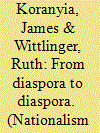| Srl | Item |
| 1 |
ID:
104052


|
|
|
|
|
| Publication |
2011.
|
| Summary/Abstract |
This article investigates the relationship between Transylvanian Saxons (Siebenbürger Sachsen) and their perceived "external homeland." The authors consider the history of German minorities in East-Central Europe and, more specifically, briefly outline the history of Transylvanian Saxons. Against this backdrop, this article examines the changing nature of minority policies promoted by the Federal Republic of Germany (FRG) until the present day, whilst juxtaposing this with Transylvanian Saxon discourses on identity and nationhood. In so doing, this article argues that the discrepancy between the mutual expectations of the FRG and Transylvanian Saxon émigrés became very pronounced after 1989. This then has led to what appears to be the end of the Saxon community, as émigrés have found themselves torn between assimilation and a longing for a return to Transylvania.
|
|
|
|
|
|
|
|
|
|
|
|
|
|
|
|
| 2 |
ID:
162436


|
|
|
|
|
| Summary/Abstract |
This article argues that German–Israeli reconciliation after 1945 has not been as exemplary as is often suggested. Drawing on key aspects which emerge from a discussion of relevant concepts in the first part of the article – transitional justice and reconciliation – it will show that Germany’s memory culture, as evidenced in the elite discourse, has indeed developed in a way that points to a successful reconciliation between the two countries. On the other hand, however, German regret emerged only reluctantly, was by and large confined to West Germany, and took a long time to establish itself formally, with emphasis on German suffering rather than suffering caused by Germans always playing an important role in German collective memory after 1945. It will also show that at grass-roots level, reconciliation between Germany and Israel is far from unproblematic. Apart from providing a critical assessment of the reconciliation between Germany and Israel after 1945, the article contributes to current academic literature on transitional justice, reconciliation and the role of memory which suggests that even though commemoration and micro-level reconciliation might be important, the geopolitical context in which reconciliation takes place and strategic security considerations also play a significant role.
|
|
|
|
|
|
|
|
|
|
|
|
|
|
|
|